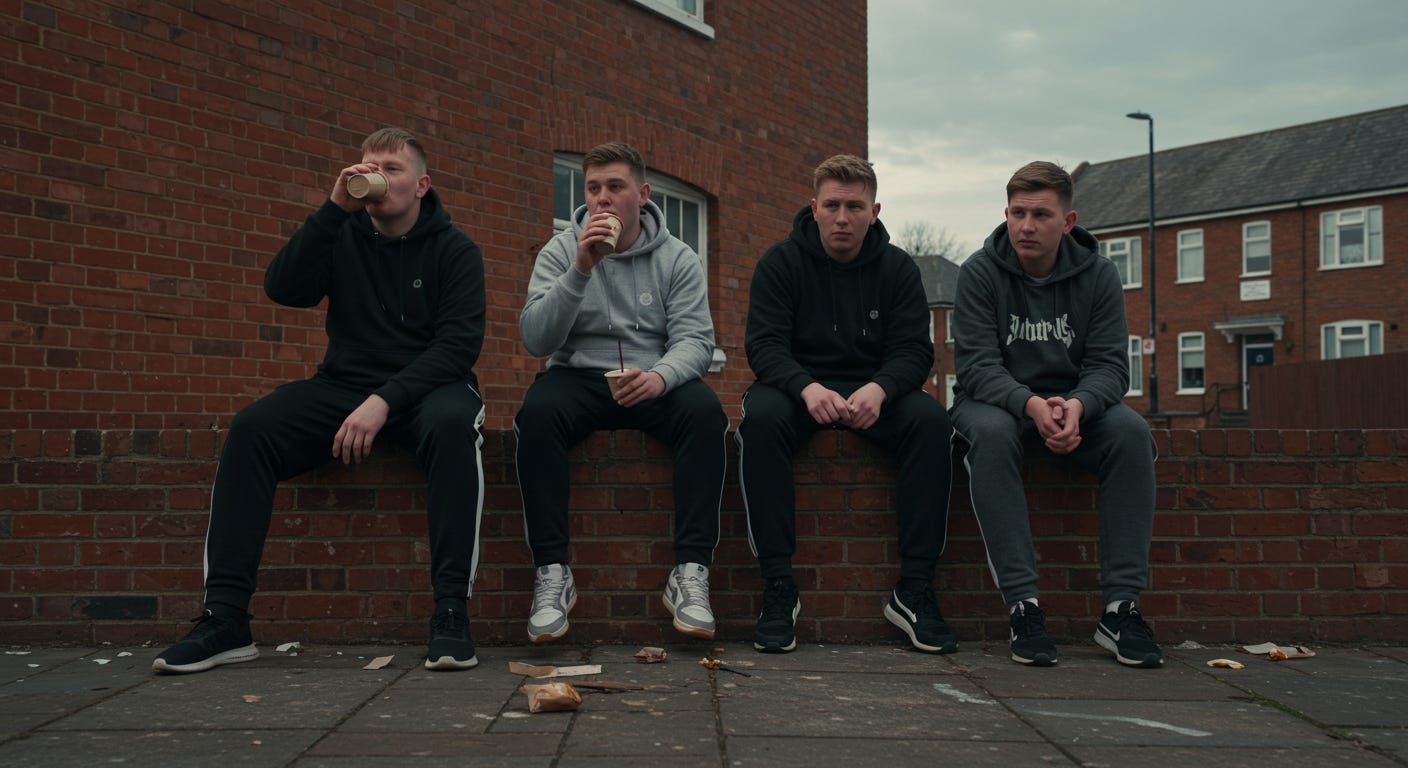Who Are the White Working Class, and Why Should We Care?
Exploring the realities and misconceptions of Britain’s white working class
‘Underdogs: The Truth about Britain’s White Working Class’ by Joel Budd; Picador / Pan Macmillan; London; 2025. Book review by Graeme Kemp
It takes a brave person to even talk about the white working class today.
Some see it as nothing more than a ‘far-right’ dog-whistle. The label white working class may appear divisive, and many deny that there is anything distinctive about this ethnic and social group. Using such a term can seem slightly embarrassing, or even suspect. Why focus on this group rather than on the disadvantages faced by non-white ethnic minorities?
Yet researcher Joel Budd is happy to use the term white working class. In Underdogs: The Truth About Britain’s White Working Class, Budd travels across the UK, interviewing those who fit that description.
The ultimate importance of understanding this group is summed up by him as follows:
…the white working class is Britain. Its problems are Britain’s problems. White working-class Britons will fare well if the entire country manages to pull in a sensible direction. If not, they won’t” (Page 279).
Ranging from the Isle of Wight on the south coast of England to Hartlepool in the north, Budd investigates white working-class culture, politics, and problems. He argues that it is wrong to assume people in this group are simply reactionary or hostile to change, or that they are victims of an elite conspiracy against white culture.
The reality is more complex, and the white working class is more diverse than some people imagine.
The white working class does face significant challenges. Many of the problems affecting this group are rooted in geography and history. White working-class communities are often located in towns or post-industrial areas far from thriving cities, limiting access to new job opportunities. By contrast, working-class members of ethnic minority groups are more likely to live in or near major urban centres, where economic growth and employment prospects tend to be stronger.
So, who is the white working-class and how do we define them?
Even when discussing class and ethnicity as ways of classifying people, Joel Budd points out that…
It is worth keeping in mind that ethnicity is not a stable, objectively verifiable characteristic like a fingerprint or an iris pattern. It is more like a judgement, a claim, or even an accent. People can and do move from one ethnic group to another during their lives.” (Page 18).
Budd defines someone as White British if they selected that category on the census, or if they describe themselves that way. He considers a person working class if they hold a working-class job, according to classifications used by the Social Mobility Commission.
While this might all sound rather technical and academic, Underdogs also explores the more vibrant and lively sides of white working-class culture.
Car modification is one of the cultural spaces Budd explores in Underdogs. He argues that it is, for the most part, a white working-class pursuit. Enthusiastic petrolheads who customise and improve their vehicles reflect a side of WWC life that is open, flexible, and forward-looking. Long dominated by men, the scene is now attracting more women as well.
Many of those involved are skilled manual workers or office employees, often with some connection to the motor trade. The culture tends to thrive in areas where people have a bit of disposable income, and the drive to work on cars can become intense, even obsessive.
What makes this world especially revealing, Budd suggests, is that it is one where working-class people set the rules and lead the way. Pride in craftsmanship and the satisfaction of creating something meaningful lie at its core. As Budd notes, a car modifier...
…will be able to create an object his or her peers consider to be beautiful. Other people will notice the car when it is on the road and, it is hoped, envy it. A working-class modifier might not have a more expensive car than a middle-class driver. But a faster car, a more distinctive car, a louder car? Certainly.” (Page 109).


Status and a sense of achievement are what motivate many white working-class car enthusiasts.
In contrast, far less satisfaction is found among residents of council estates, who face a range of serious challenges. Budd examines life on the New Parks estate in Leicester, where many residents report feeling unsafe and anxious, often due to gangs and frequent burglaries, sometimes committed by people from the same community. Drug use further undermines the already difficult lives of many who live there.
As Budd explains, council estates have historically played a central role in the lives of large numbers of white working-class people. Living on an estate can shape not only daily routines but also a person’s sense of identity. Residents may not always like what happens in their area, but many cannot imagine leaving.
Council estates were originally designed to encourage a mix of social classes. However, by the 1980s, this vision had largely eroded as poverty and unemployment began to reshape life on estates like New Parks. Over time, these areas increasingly became associated with housing people facing significant social challenges.
The arrival of immigrants and ethnic minorities in the 1970s and 1980s was, in some cases, met with hostility, including violence and outbursts of rage. Official responses to these tensions were often inadequate. The evidence of criminal attacks and racist assaults from that period is rather troubling.
And yet – things did eventually improve. The New Parks estate has become more ethnically mixed, with more black and Asian families living there today. Budd notes that now the “quiet integration” (page 102) of previously all-white housing estates is increasingly a success story – the “sharp edge of resentment and hostility has gone…” (Page 102).
As Budd notes: white working-class residents increasingly seem to view themselves less and less as a distinct, separate group, contrasted with other different ethnic groups. The notion of competing with these other ethnicities over resources such as housing will continue to decline, if trends persist. There are still a few complaints and grumbles about diversity and change from some white residents, but things are much better now.
Budd deserves credit for exploring a fascinating range of other aspects of WWC life, including education. This is investigated in the context of the predominantly white, Isle of Wight. The reasons for educational underachievement on the island seem clear: people find it easier to take more usually working-class jobs locally, where family members live, than cross the area of water called The Solent to the mainland. On the mainland, there are more highly paid or professional jobs with increased chances of progression.
So, Joel Budd’s ‘Underdogs’ ends with some suggestions to make things better, for the white working-class – and everyone else. The WWC doesn't need targeted, special help. And he is blunt: the old heavy industry jobs that were traditionally linked to the WWC are not likely to come back.
Instead, education must be improved, breaking the repetition of underachievement across the generations. More homes for everyone will help too – overpriced housing is still a barrier to a better life for many. The government must do everything it can to boost economic growth and spread opportunities to less successful areas of the UK. We must end political centralisation in the UK and devolve more power to local authorities to change things.
And the UK must work harder and better at integrating immigrants into wider society. That way everyone benefits, both immigrants and indirectly, the WWC.
This is a remarkable book that makes for fascinating reading. I wouldn’t agree with everything Joel Budd argues – I think we probably do have a ‘woke’ elite detached from the WWC and everyone else. However, ‘Underdogs’ still makes some great points.
The book is available to buy here.
https://www.waterstones.com/book/underdogs/joel-budd/9781035015122
The Equiano Project is kept going by donations, large and small. Whatever the amount, we would greatly appreciate your contribution.
You may also like:



The government won’t fix this, neither will the elite classes, the individuals need to fix themselves, nobody else will. I say that as a white working class man who was bought up on a council estate in Birmingham by a single mother.
The government and the trade unions have been trying to fix this for the 50+ years since I started work at 16 and they have spectacularly failed.
Give individuals the freedom to choose opportunities and remove the mass regulation culture.